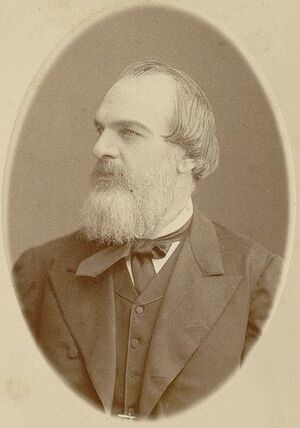Vladimir Kashperov
Russian composer and teacher (b. 25 August/6 September 1826 at Chufarovo, near Simbirsk; d. 26 June/8 July 1894 at Romantsevo, near Moscow), born Vladimir Nikitich Kashperov (Владимир Никитич Кашперов).
After completing his studies at the School of Guard Ensigns in Saint Petersburg, Kashperov in 1844 joined a Life-Guards' cuirassiers' regiment, but his military career did not last long. At first he had some lessons with the well-known German pianist and composer Adolf von Henselt (1814-1889), who had settled in Russia. Eventually, though, Kashperov's love for music led him to leave the army and to go abroad to Berlin in order to receive a more thorough musical training. After the 1848 revolutions he was forced to return to Russia. During the Crimean War, he commanded a company of the Simbirsk militia which took part in the tragic defence of Sevastopol against British and French forces in 1854-55. After marrying, he went abroad again to Berlin in the latter half of 1856 to study music theory with Siegfried Dehn (1799–1858), who had also helped Glinka to perfect his counterpoint technique. It was also during his stay in the Prussian capital that he became friends with Glinka, who gave singing lessons to Kashperov's wife. Together with Dehn and Meyerbeer, Kashperov was one of the three musicians who attended Glinka's funeral in Berlin in February 1857. (The great composer's remains would later be taken to Russia for burial there). After Glinka's death Kashperov and his wife moved to Italy.
Kashperov attempted his first opera The Gypsies in 1850, based on Pushkin's poem and with a libretto provided by the revolutionary poet Nikolay Ogaryov (1813–1877), but it remained unfinished. During his long residence in Italy (from 1857 to 1865), he composed a number of operas in the Italian style and using Italian librettos, including Maria Tudor, which was staged in Milan in 1859, and Rienzi (1863). He was acquainted with the novelist Ivan Turgenev, who for a while saw in him a possible "heir to Glinka".
In 1865, he received an invitation from Nikolay Rubinstein to become professor of singing at the newly opened Moscow Conservatory. Kashperov accepted and returned in 1866 to Russia, where he also tried to make a name for himself as a composer by asking Aleksandr Ostrovsky to adapt his famous tragedy The Storm (Гроза) into an operatic libretto. When Tchaikovsky found out in the winter of 1866-67 that this tragedy, which was very close to his heart and had inspired his youthful overture The Storm, was now being turned into an opera by Kashperov, he was very disappointed because he had hoped to do so himself [1]. The premiere of Kashperov's opera The Storm at the Moscow Bolshoi Theatre on 30 October/11 November 1867 achieved a certain success, but when it was staged at the Saint Petersburg Mariinsky Theatre later that year it proved an outright failure. The critics unanimously attacked Kashperov for treating such a profoundly Russian subject in the style of Donizetti. César Cui even made a quip about "il signor maestro Kasperoff"!
Kashperov taught singing at the Moscow Conservatory for a number of years (1866–72), where he was a colleague of Tchaikovsky. There seems to have been a certain ill-feeling between the two, as Kashperov was liable to resent the successes of others, and Tchaikovsky wrote ironically about Kashperov's teaching methods in some of his articles (e.g. TH 277). In 1873 he went back to Italy for a while, but later returned to Moscow, where Turgenev was an occasional visitor to his house during his last stays in Russia. Kashperov's last opera Taras Bulba, based on Gogol's historical tale of the Zaporozhian Cossacks, was staged at the Moscow Bolshoi Theatre on 20 April/2 May 1887, but did not maintain itself on the repertoire. In 1890, he became a teacher of choral song at various zemstvo schools in the Moscow province and held this post until his death. Apart from operas, Kashperov also wrote a number of songs and works of Orthodox liturgical music. He also published some reminiscences of Glinka (1869) and a compendium of singing exercises for primary schools (1893).
Tchaikovsky's Arrangements of Works by Kashperov
In 1867, Tchaikovsky arranged the introduction from Kashperov's opera The Storm for solo piano (TH 254). This arrangement was published without his name, and Tchaikovsky's authorship was only established in 2012 [2].
Bibliography
- Vasily Kiselev's introduction to Kashperov's correspondence with Aleksandr Ostrovsky in: А. Н. Островский и русские композиторы. Письма (Moscow ; Leningrad : Искусство, 1937), p. 67-72.
External Links
Notes and References
- ↑ See Жизнь Петра Ильича Чайковского, том 1 (1997), p. 239.
- ↑ See TH 254. It is not known whether Tchaikovsky arranged any other parts of Kashperov's opera, besides the introduction.

